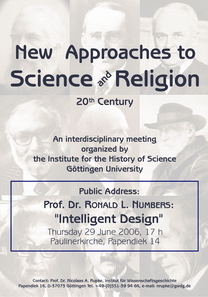Thursday 29 June 2006
14.00 Registration
Theme: New Approaches to Science-and-Religion
Chair: Norbert Elsner (Göttingen)
14.15 Nicolaas
A. Rupke (Göttingen): Old and New
Approaches
14.45 Simon Conway Morris (Cambridge): Does Evolution Have
Directionality, Even Destinations?
15.30 Tea
16.00- Ulrich Kutschera (Kassel): Science-and-Religion in Germany Today
16.45
Keynote Address (venue: Paulinerkirche)
Chair: Michael Ruse (Florida-Tallahassee)
17.15 Ronald
L. Numbers (Madison): Intelligent Design
18.30 Sherry reception
Friday 30 June 2006
Theme: Eminent Lives in the Biological
Sciences-and-Religion
Chair: James R. Moore
(OU/Cambridge)
09.00 Mario
di Gregorio (L'Aquila): Ernst
Haeckel (1834-1919)
09.30 Torsten Rüting (Hamburg): August Forel (1848-1931)
10.00 Volker Wissemann (Jena), Johannes Reinke (1849-1931)
10.30 Coffee
11.00 Karen E. Wonders (Göttingen): Pierre Teilhard de Chardin (1881-1955)
11.30 Thomas
F. Glick (Boston): Teilhardian Evolutionists in
Catholic Spain
12.00 General discussion
12.30 Lunch
Theme: Eminent Lives in the Physical
Sciences-and-Religion
Chair: John L. Heilbron (Berkeley
and Oxford)
14.00 Edward B. Davis (Messiah College), Robert Millikan (1868-1953)
14.30 Gebhard Löhr (Göttingen/Osnabrück), Albert Einstein (1879-1955)
15.00 Jason
M. Rampelt (Cambridge): Arthur Eddington (1882-1944)
15.30 Tea
16.00 Martin Riexinger (Göttingen): Abdus Salam (1926-1996)
16.30 Subrata
Chattopadhyay (Maharajah's Institute of Medical Sciences, Nellimarla,
Andhra Pradesh): The Hindu Perspective
with Reference to Satyendranath Bose
(1894-1974)
17.00- General discussion
17.30
19.00 Conference dinner, Burgschänke Plesse
Saturday 1 July 2006
Theme: Locating
Ourselves
Chair:
Thomas F. Glick (Boston)
09.00 Frederick
Gregory (Florida-Gainesville): Baptist
background
09.30 Ronald
L. Numbers (Madison): Seventh-day Adventist background
10.00 Robert
J. Richards (Chicago): Catholic background
10.30 Coffee
11.00 Michael
Ruse (Florida-Tallahassee): Quaker
background
11.30 Nicolaas
A. Rupke (Göttingen): Dutch
Reformed background
12.00 General discussion
12.30 Farewell lunch
Venue:
Seminar room, Old Library, Papendiek 14.
Abstract
In
recent years, accompanied by debates about Intelligent Design, a "God
gene," and "religion as a meme," the issue of
science-and-religion has drawn international attention. Literature on the
subject is burgeoning, written by authors from a wide range of academic
disciplines. From them we learn, among other things, that "science"
and "religion" are characterized by a considerable plasticity of
meaning and, moreover, by an equally considerable variability of interplay.
Varieties of interaction range from cooperation to competition; from peaceful
coexistence to territorial conflict; from mutual enhancement to all out
warfare; from cooptation to eradication – "complexity" being a key
word.
Nowhere
is this complexity more evident than in the many concrete "lives in
science-and-religion," and we intend to use the biographical approach to
explore the relationship. Reconnecting with the early classics by the Lutheran
theologian Otto Zöckler (Gottes Zeugen im
Reich der Natur, 1881) and the Catholic church historian Karl Alois Kneller
(Das Christentum und die Vertreter der
neueren Naturwissenschaft, 1903), we shall examine the religious conduct of
science in the case of mainly Christian but also Jewish, Muslim and Hindu
scientists.
Moreover,
we shall be concerned to "locate" the scientists' views by
determining their cultural coordinates. Which socio-political interests were
and are being served by their stances as well as by the spin-off literature on
their views? And, if new understanding is to be gained from "putting lives
in science-and-religion in their place" – to paraphrase David Livingstone
– why not also "locate" the views of those who write about these
scientific-religious lives? What were the purposes of all those historians,
popularizers and many others who have written about such great religious
scientists as Pierre Teilhard de Chardin or have brought Albert Einstein's name
and reputation to bear on "God-and-the-universe?" In carrying this
approach to its fair conclusion, we intend to end the conference with an
autobiographical session in which a number of the conference participants
address the topic of their past and present work, "revealing" its
connections with their religious background, upbringing, education, career
purposes and other constitutively relevant factors.
The conference brings together experts from science,
history, philosophy and theology, and marks the concluding phase of a research
project on "Eminent scientists and religious belief – twentieth
century," funded by the John Templeton Foundation at the Göttingen
Institute for the History of Science. Additional funding for this conference
has been generously provided by the Fritz Thyssen Foundation.








